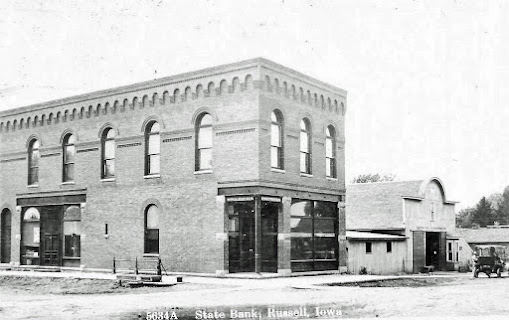About the only positive thing that can be said about the great Russell bank robbery of Nov. 30, 1910, is that no one got hurt --- and that's a little surprising considering some of the circumstances that now seem comedic. Here's how the story was reported in The Herald-Patriot of Dec. 1:
+++
The town of Russell had a genuine sensation last night. Six men tried to rob the bank there, but did not succeed in getting any money. The story of the affair runs about as follows:
About midnight George Stearns, a young man who had been helping Futheys to pack their restaurant goods preparatory to moving away, went to the town pump at the Russell State Bank corner to get a drink before going home. A man with a revolver met him there and told him to walk into the bank and keep quiet. Inside the bank Stearns was tied, but not blindfolded. He saw six men trying to blow up the bank vault.
Some of them guarded him and the outside of the building while others worked at the vault. He could not see their faces closely, as it was very dark and they used only a flash light. He counted fourteen shots fired, four of them very heavy ones. When the heavy shots were fired the men would all go out into the street, taking Stearns with them. They worked until about three o'clock, getting the outer doors off, and were getting close to the money when something either frightened them, or they ran out of caps for firing, for one of them said, "It's time to go; here comes a rambler," and they all left, probably boarding a freight train that went through the town westward about that time.
Some of the explosions were very loud, and some people living nearby heard them, but thought nothing of them. J.N. Jeffries, president of the bank, lives not far away, and he and his son, Homer, who is assistant cashier, were awakened about three o'clock and wondered what the noises meant. Homer got up and went down town to see if the bank was all right. As he did so, the last loud explosion took place and he saw a couple of men standing in front of the bank. He yelled to give the alarm and ran over to the depot and telegraphed to Sheriff Lyman, who with Night Watchman Frank Shaffer boarded the switch engine and reached Russell about four o'clock, but could find no trace of the robbers. Up to the time of going to press no clue has been found.
It is thought that nitro glycerin was used for the explosions. The vault doors are badly shattered, and the bank is not doing business today. The bank is a State Bank, with $25,000 capital. Its deposits averaged from $100,000 to $125,000. The amount of cash on hand is rarely over $5,000, so the robbers would not have made a big haul. J.N. Jeffries is president of the bank, P.H. Stech is vice president, P.A. Rockey is cashier and Homer Jeffries is assistant cashier. The stock is owned by a large number of residents of Russell and vicinity.
+++
Finding no one else to charge, law enforcement officers arrested the witness, the unfortunate Mr. Stearns, a young man with a wife and infant son who lived in Russell with his parents and was employed at the livery barn, visible to the right of the bank in the image here. The charge was complicity.
George was bound over to the grand jury on the Monday after the robbery with bond set at $1,000. No one in his family had that kind of money, so George sat in the Lucas County Jail for the next six weeks, awaiting the grand jury's next assembly.
According to other newspaper reports, few if any actually believed George was guilty and when the jury assembled in mid-January, it heard the evidence and immediately dropped the charges.
+++
George and his wife, Mary, moved away from Russell after he found employment with the railroad, a job that would take the family to various places in the country during their marriage. He was living in Idaho when he enlisted for World War I service and in Utah, when he died at the age of 60 in the Veterans Administration Hospital in Salt Lake City during 1947 of pancreatic cancer. He was survived by his wife and three sons. A fourth son, Kirk, had been killed in combat during World War II.


No comments:
Post a Comment